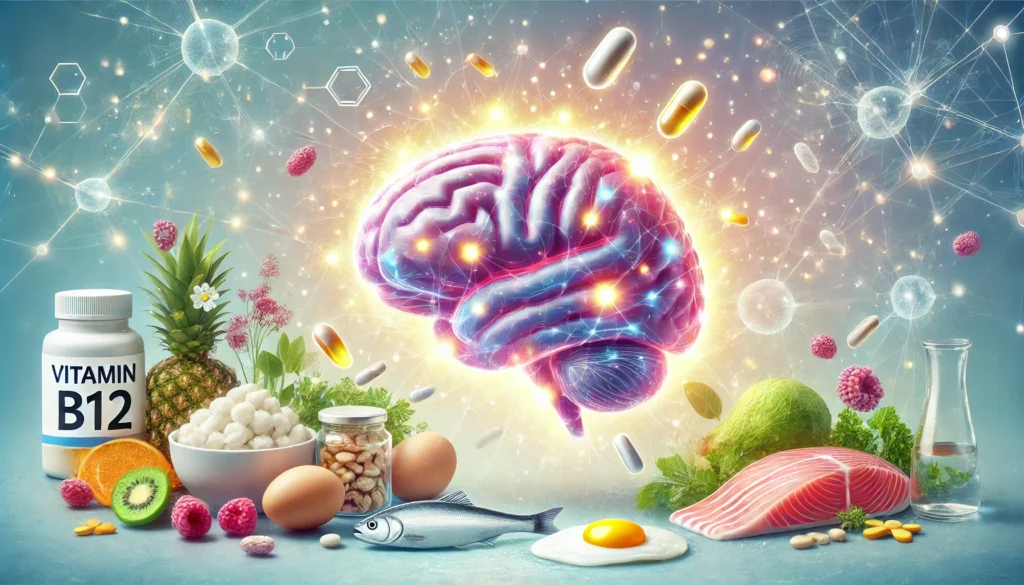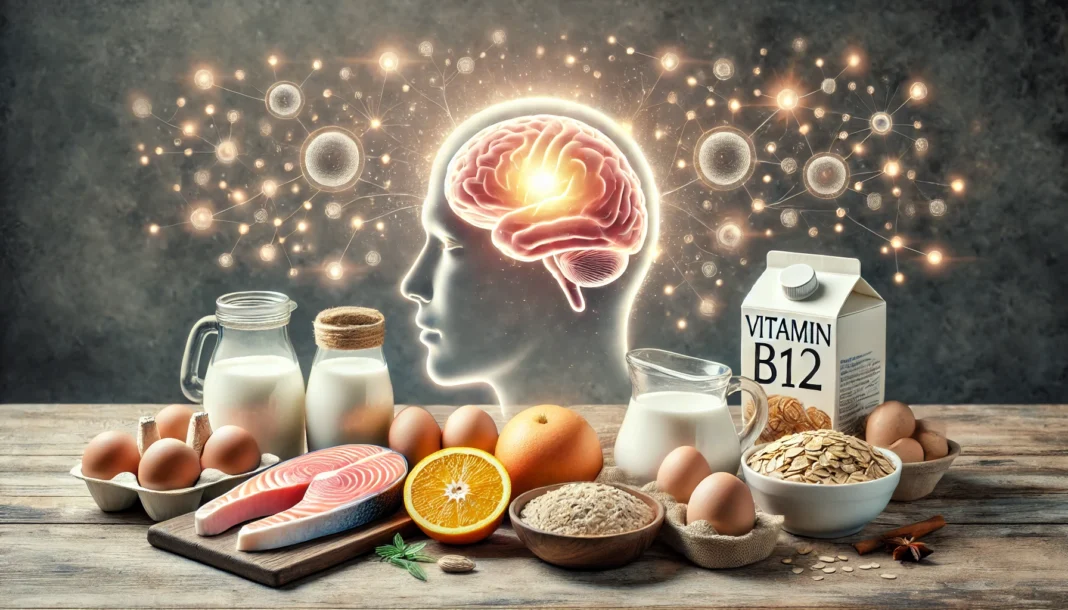Introduction
Vitamin B12 is a critical nutrient that plays a fundamental role in brain health, nerve function, and the formation of red blood cells. Among its many functions, its potential impact on cognitive health and memory has been widely studied. The question remains: Is B12 good for memory? This article explores the relationship between vitamin B12 and cognitive function, drawing from scientific research, clinical trials, and expert analyses.
Deficiencies in vitamin B12 have been linked to cognitive decline, memory loss, and neurological impairments. As such, many researchers have investigated whether supplementation can improve memory, slow cognitive decline, or even prevent neurodegenerative diseases. Understanding the mechanisms behind vitamin B12’s effects on the brain requires an exploration of its role in methylation, myelin production, and neurotransmitter function. This article delves into these biological processes and evaluates the latest research on whether vitamin B12 is beneficial for memory retention and cognitive function.
You May Also Like: Are Vitamins a Source of Energy? Understanding Their Role in Metabolism and Vitality
Understanding Vitamin B12: What It Is and How It Works
Vitamin B12, also known as cobalamin, is a water-soluble vitamin essential for various physiological processes. Unlike other vitamins, B12 is unique because it is only naturally found in animal products such as meat, eggs, dairy, and fish. It is also available in fortified foods and supplements, which can be crucial for individuals following vegetarian or vegan diets.
The human body relies on vitamin B12 for multiple biochemical functions, including DNA synthesis, red blood cell formation, and neurological function. A key aspect of B12’s role in the brain is its involvement in the methylation cycle, a biochemical process crucial for gene regulation and neurotransmitter production. Methylation is essential for maintaining neuronal health and function, which in turn influences cognitive abilities such as memory, focus, and learning capacity.
Additionally, vitamin B12 supports the production of myelin, a protective sheath around nerve fibers that enhances signal transmission in the brain. Damage to myelin has been associated with neurodegenerative conditions such as multiple sclerosis and Alzheimer’s disease. Therefore, maintaining adequate B12 levels is necessary for preserving neural integrity and preventing cognitive impairment.
The Link Between Vitamin B12 and Cognitive Function
The relationship between vitamin B12 and cognitive health has been extensively studied, particularly in older adults who are at greater risk for deficiency. Several clinical trials and observational studies have examined whether vitamin B12 supplementation can enhance memory and cognitive performance.
One of the primary concerns regarding vitamin B12 deficiency is its association with cognitive decline and dementia. A study published in The American Journal of Clinical Nutrition found that individuals with lower B12 levels exhibited higher rates of brain atrophy, memory impairment, and reduced cognitive function (Smith et al., 2010). Researchers concluded that maintaining sufficient B12 levels is crucial for brain health, particularly in aging populations.
Furthermore, a meta-analysis published in Neurology reviewed multiple studies and found that individuals with adequate vitamin B12 intake had a significantly lower risk of developing Alzheimer’s disease and other neurodegenerative conditions (Morris et al., 2018). However, while these studies suggest a correlation between B12 levels and cognitive function, causation remains difficult to establish, necessitating further research.

Does Vitamin B12 Help with Memory?
Many individuals wonder: Does vitamin B12 help with memory? While evidence suggests that B12 is essential for brain health, the extent to which it enhances memory remains an ongoing subject of investigation. Several mechanisms explain how B12 may contribute to memory function:
- Reduction of Homocysteine Levels: Elevated homocysteine, an amino acid linked to neurotoxicity, is associated with cognitive decline. Vitamin B12 helps convert homocysteine into methionine, a crucial amino acid involved in brain function. Lowering homocysteine levels has been associated with improved memory performance in some studies (Selhub et al., 2000).
- Support for Neurotransmitter Production: B12 plays a role in the synthesis of neurotransmitters such as serotonin and dopamine, which are involved in mood regulation and cognitive function. An imbalance in these neurotransmitters can negatively impact memory retention and recall.
- Prevention of Brain Shrinkage: MRI studies have shown that individuals with B12 deficiency are more likely to experience brain shrinkage, a factor associated with memory loss and reduced cognitive abilities. Supplementation may help slow this process, particularly in older adults.
While these mechanisms provide insight into how B12 supports memory, clinical studies remain mixed regarding the effectiveness of supplementation in improving cognitive function among those who are not deficient.
The Role of Vitamin B12 in Age-Related Cognitive Decline
As people age, cognitive function naturally declines, leading to concerns about memory loss, reduced focus, and an increased risk of neurodegenerative diseases. Research suggests that ensuring optimal vitamin B12 levels may play a role in slowing this decline.
A study published in JAMA Psychiatry examined elderly individuals with mild cognitive impairment and found that those with higher B12 levels performed better on memory tests than those with lower levels (Oulhaj et al., 2016). However, supplementation did not significantly improve memory in individuals who already had sufficient B12 levels. This suggests that while B12 is crucial for brain health, excess supplementation may not provide additional cognitive benefits.
One of the key challenges in studying vitamin B12 and cognitive health is that many factors contribute to memory and brain function, including diet, lifestyle, genetics, and other nutrient interactions. Nevertheless, maintaining adequate B12 levels remains an essential aspect of preserving cognitive health in aging populations.
Is Vitamin B12 Good for Memory in Younger Adults?
While much of the research on vitamin B12 and memory focuses on older adults, some studies suggest that younger individuals may also benefit from adequate B12 intake. Memory formation and recall depend on a well-functioning nervous system, and B12 plays a role in maintaining neuronal health.
A study conducted at Oxford University found that college students with borderline B12 deficiency exhibited poorer memory performance compared to those with optimal levels (Haskins et al., 2019). Additionally, supplementation in individuals with marginal deficiencies improved cognitive function, suggesting that even mild insufficiencies can impact memory.
However, for young, healthy individuals who consume a balanced diet, additional supplementation may not significantly enhance memory beyond normal cognitive function. Instead, ensuring adequate intake through diet or supplements is primarily beneficial for those with dietary restrictions or absorption issues.

Frequently Asked Questions (FAQ) About Vitamin B12 and Memory
1. How does vitamin B12 support memory and cognitive function?
Vitamin B12 plays an essential role in cognitive health by aiding in the production of myelin, the protective sheath surrounding nerve fibers. This protective function ensures efficient communication between neurons, which is crucial for memory formation and retrieval. Additionally, vitamin B12 is involved in the synthesis of neurotransmitters such as serotonin and dopamine, which regulate mood and cognitive performance. A deficiency in B12 can lead to cognitive fog, slower information processing, and impaired memory recall. Ensuring adequate intake through diet or supplementation may help maintain cognitive sharpness and reduce the risk of neurodegenerative conditions.
2. Is B12 good for memory improvement in individuals without a deficiency?
Research suggests that vitamin B12 is primarily beneficial for cognitive function in individuals with low or borderline levels of the vitamin. Those with a deficiency may experience significant improvements in memory, focus, and mental clarity upon supplementation. However, for individuals who already have optimal B12 levels, additional supplementation may not result in noticeable cognitive enhancements. Instead, maintaining sufficient B12 intake through a balanced diet supports overall brain function and prevents future deficiencies. While B12 is crucial for memory, other lifestyle factors such as sleep, exercise, and mental stimulation also play key roles in cognitive health.
3. Does vitamin B12 help with memory loss due to aging?
Aging naturally comes with some degree of cognitive decline, and vitamin B12 has been studied for its potential role in slowing this process. Several studies indicate that older adults with sufficient B12 levels experience better memory retention compared to those with a deficiency. One key mechanism is its ability to reduce homocysteine levels, which are linked to an increased risk of Alzheimer’s disease and other forms of dementia. While B12 alone may not prevent memory decline, it is an important component of a brain-healthy diet, especially for seniors. Regular screenings for B12 levels can help older adults ensure they are meeting their neurological needs.
4. Can vitamin B12 deficiency cause permanent memory damage?
Prolonged B12 deficiency can lead to serious neurological issues, including memory loss and cognitive decline. If left untreated, severe deficiency can result in nerve damage, which may become irreversible over time. Early signs of B12 deficiency-related memory impairment include forgetfulness, difficulty concentrating, and confusion. If caught early, these symptoms are often reversible with appropriate B12 supplementation. However, if deficiency persists for an extended period, the risk of long-term neurological damage increases, emphasizing the importance of regular dietary intake and monitoring.
5. What is the best way to get enough B12 for cognitive health?
The most effective way to ensure adequate vitamin B12 intake is through a well-balanced diet rich in animal-based foods such as meat, dairy, eggs, and fish. For vegetarians and vegans, fortified foods such as plant-based milk and cereals can provide sufficient B12. Supplements and B12 injections are also viable options for those with absorption issues or dietary restrictions. Since B12 is water-soluble, the body excretes excess amounts, making it difficult to overdose on dietary sources. However, individuals with digestive conditions such as Crohn’s disease or pernicious anemia may require specialized medical intervention to maintain adequate levels.
6. Is vitamin B12 good for memory enhancement in students and young adults?
For students and young professionals looking to optimize memory and cognitive function, vitamin B12 plays a supporting role rather than acting as a direct cognitive enhancer. Studies indicate that individuals with even mild B12 deficiencies can experience cognitive sluggishness, which may impair academic performance. However, for those who already have sufficient B12 levels, additional supplementation may not provide noticeable improvements. A well-rounded approach, including a nutrient-rich diet, mental exercises, and proper sleep, is essential for sustaining peak cognitive function. While B12 is beneficial, it should not be viewed as a standalone solution for memory enhancement.
7. Does vitamin B12 help with memory loss associated with stress and anxiety?
Chronic stress and anxiety can negatively impact memory and cognitive function, often leading to mental fatigue and forgetfulness. Vitamin B12 contributes to stress regulation by supporting neurotransmitter balance and reducing homocysteine levels, which are linked to mood disorders. Some studies suggest that adequate B12 levels can improve mental clarity and resilience against stress-related cognitive decline. While B12 is not a direct treatment for anxiety-induced memory problems, ensuring proper intake may help mitigate some of the cognitive effects of chronic stress. Combining B12 with stress management techniques such as mindfulness and exercise can further enhance mental performance.
8. How quickly does vitamin B12 supplementation improve memory in deficient individuals?
The timeline for cognitive improvements after starting vitamin B12 supplementation varies based on the severity of deficiency and individual response. Some individuals notice enhanced mental clarity, focus, and memory within a few days to weeks of consistent supplementation. However, in cases of long-term deficiency, it may take several months for neurological symptoms to fully improve. Regular follow-ups with a healthcare provider can help track progress and adjust dosage if necessary. Since B12 is involved in many bodily processes, improvements in energy levels and overall cognitive function are often observed alongside memory enhancement.
9. Are there any risks associated with taking too much vitamin B12 for memory support?
Vitamin B12 is generally considered safe, even at high doses, because it is water-soluble, meaning excess amounts are excreted through urine. However, some individuals may experience mild side effects such as headaches, nausea, or dizziness when taking very high doses of B12 supplements. In rare cases, excessive B12 intake may lead to imbalances in other nutrients, such as folate. While there is no established upper limit for B12 consumption, it is always best to take supplements under medical supervision. Ensuring a well-balanced diet alongside B12 intake helps prevent unnecessary over-supplementation.
10. Can vitamin B12 interact with medications that affect memory?
Certain medications can interfere with the body’s ability to absorb vitamin B12, potentially leading to deficiencies that impact memory and cognitive function. Proton pump inhibitors (PPIs) used for acid reflux, metformin for diabetes, and some anticonvulsants have been linked to reduced B12 absorption. Individuals taking these medications long-term may require B12 supplementation to prevent cognitive side effects. Consulting a healthcare provider for regular blood tests and dietary adjustments can help mitigate these risks. If memory issues arise while taking these medications, assessing B12 levels may be a crucial step in addressing the underlying cause.

Conclusion: The Role of Vitamin B12 in Cognitive Health
Is B12 good for memory? This is best answered by considering its role in maintaining neurological health and preventing cognitive decline. While vitamin B12 is essential for brain function, its impact on memory enhancement depends largely on individual factors such as age, baseline nutrient levels, and overall health status. Research strongly supports the idea that maintaining adequate B12 levels is necessary for cognitive health, particularly in older adults at risk for deficiency.
For individuals with B12 deficiency, supplementation can improve cognitive function and potentially slow memory decline. However, for those with sufficient levels, additional supplementation is unlikely to provide significant memory-enhancing effects. Given the importance of B12 in overall brain health, ensuring a diet rich in B12-containing foods or taking supplements when necessary is a practical approach to preserving cognitive function over time.
brain health supplements, cognitive enhancement, vitamin B12 benefits, neurological health, memory support vitamins, cognitive decline prevention, mental clarity supplements, B12 deficiency symptoms, brain fog remedies, nerve function support, homocysteine and cognition, aging and memory loss, neurotransmitter balance, dietary sources of B12, myelin sheath protection, cognitive wellness, neuroprotection strategies, memory retention tips, vitamin absorption and brain health, cognitive function optimization



